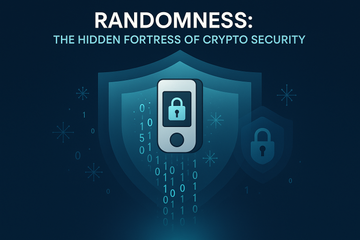Picture this: you're about to stash away a chunk of your cryptocurrency fortune, ensuring that only you can access it. In this intricate dance, hardware wallets like Trezor and Ledger slide in like the trusty security guards you've always wanted. But what really makes them tick? You might be surprised to learn it all starts with something as simple – yet crucial – as random numbers. Let’s unravel this fascinating process and see how Random Number Generators (RNG) play a star role in keeping your digital treasures safe and sound.
The Kind of Random We Rely On
When we talk about ‘random’, we don't mean pulling numbers out of a hat at a party. Nope, the randomness required for generating keys in hardware wallets is of a whole different caliber. Think of it like the heartbeat of your wallet – consistent, secure, and relentless in its privacy duties. But why all the fuss over randomness? It’s simple, really. In the realm of crypto security, predictability spells vulnerability.
Understanding RNG in Layman’s Terms
Before we dig deeper, let’s tackle a quick jargon buster. A Random Number Generator in your hardware wallet is essentially a clever little engine that produces sequences of numbers or symbols that cannot be distinctly predicted. These sequences are essential for crafting private keys, which in turn, control access to your crypto assets. So, if we're talking security, that tiny engine is like a vault within a vault.
This might remind you of rolling dice—except, in this scenario, the dice don’t favor any number, every roll is unique, unpredictable, and crucially, hidden away where no sneaky hands can access it. Bingo! That’s exactly what you want when creating a secure key.
Why Does RNG Matter So Much?
You might wonder, 'Why can't the numbers be simple?' Well, here’s the scoop: in the context of hardware wallets, randomness ensures that private keys cannot be easily guessed or determined. If hackers can't predict your keys, they can't swipe your assets. This randomness is critical to maintaining security and ensuring that no two keys are the same, akin to snowflakes fluttering from the winter sky – unique and unreplicable.
But hold on, it gets more interesting. RNGs aren’t just picking any random number; they’re picking numbers within a vast sea of possibilities that’s so large, it's nearly impossible for any brute force attack to crack through. Try guessing a number from 1 to a trillion – more or less, that’s what RNG is dealing with.
The Tech Behind the Security Blanket
Hardware wallets like Ledger or Trezor implement RNG through specialized chips and algorithms. These tools are built on complex mathematical principles that keep our crypto secrets locked tight. Whether it’s drawing from thermal noise, radioactive decay, or even chaotic systems, these elements add layers of unpredictability, turning our wallets into fortresses.
Types of RNGs in Practice
Now, not all RNGs are born equal. In the cryptographic world, we differentiate between two main types: True Random Number Generators (TRNG) and Pseudo-Random Number Generators (PRNG). TRNGs are kind of like the free spirits of randomness, relying on unpredictable physical processes. By contrast, PRNGs use algorithms to produce 'random' sequences, though still robust, tend to fall behind TRNGs' unpredictability.
But don’t start fretting if your beloved hardware wallet uses a PRNG. In reality, for most practical purposes, both types offer sufficient randomness. It's more like choosing between silk and cashmere – both are swanky in their own right.
Looking Ahead: The Future of Secure Key Generation
As the crypto industry evolves, so too does our need for resilient security measures. Think of today's RNG technology as your trusty Volvo – reliable and dependable. Moving forward, innovations in cryptography continually push us towards refining these RNG techniques, much like upgrading to a sleek electric model.
What's on the horizon? Quantum computing and advanced cryptographic algorithms promise newer layers of security. Imagine a world where even the wildest guess won't get you anywhere near cracking a wallet – that's the direction RNG tech is hurtling toward.
The Human Element
Technology advancements aside, there's one element that stands immutable: us, the users. While RNG does the grunt work of keeping things seamless and secure behind the scenes, staying informed and vigilant about crypto security matters just as much. It's like having a state-of-the-art alarm system – it’s not foolproof unless you remember to set it before you leave the house.
Conclusion
The magic of hardware wallets and their reliance on RNG for key creation underscores an important truth: in a world driven by digits and data, randomness isn’t just a feature – it’s a fortification. As the cryptographic landscape shifts and evolves, the core principles of randomness keep holding their ground, seamlessly guarding your crypto treasures. Next time you clutch your Trezor or Ledger, take a moment to appreciate the quiet genius of RNG and how it subtly, yet powerfully, shields what you hold dear.











